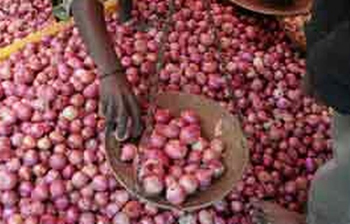 Bangalore, Jun 20: The onion price in Bangalore has gone up by nearly Rs. 10 a kilo in the wholesale market over the last fortnight and is likely to increase further, according to onion traders at the Agriculture Produce Marketing Committee (APMC). The retail price of good quality onion, which was in the range of Rs. 10 to Rs. 15 a kilo, is now above Rs. 25.
Bangalore, Jun 20: The onion price in Bangalore has gone up by nearly Rs. 10 a kilo in the wholesale market over the last fortnight and is likely to increase further, according to onion traders at the Agriculture Produce Marketing Committee (APMC). The retail price of good quality onion, which was in the range of Rs. 10 to Rs. 15 a kilo, is now above Rs. 25.
The increase, they say, is due to a shortage of supply from Maharashtra even as supply from Karnataka has almost come to an end. While a quintal of onion was traded between Rs. 1,000 and Rs. 1,200 till about the beginning of June, it is currently being traded around Rs. 2,500. S. Balakrishna, vice-president of Bangalore Onion and Potato Merchants Association, said that the current price is almost comparable to that in the corresponding period last year when heavy rainfall damaged crops. A quintal of good quality onion last June cost about Rs. 3,000.
The price, Mr. Balakrishna said, could go up further during marriage season when demand for good quality onion goes up. “The big onion used in hotels and marriages come to us from Maharashtra. The current stock may not be sufficient to meet the demand,” he said, adding that high prices may prevail till August-September when fresh stock will come from Karnataka.







Comments
Add new comment